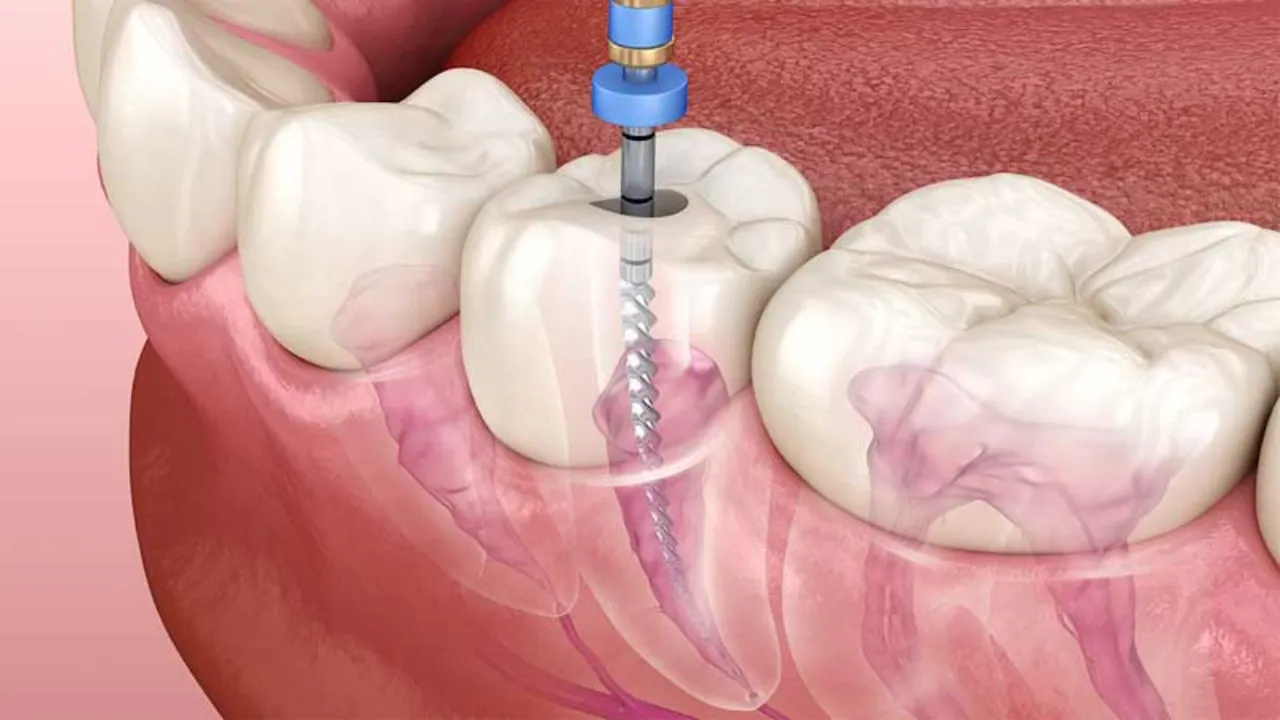
Root Canal Treatment Procedure | Root Canal Treatment In Vadodara

Root canal therapy or Root canal treatment , also known as an endodontic procedure, is a common procedure used by modern dental practices for the removal of inflammable and inflamed or infected pulp or skin inside the teeth.
Under emulsion and dentin layers, pulps are buried within the tooth enamel or dentine layers. It contains blood vessels, veins, nerve fibers, and other connective tissue and cells. Despite the fact that blood vessels in the pulp can provide nourishment from surrounding cells,
it is also necessary for tooth development. Root canals remove tissue from a fully developed tooth that has contaminated pulp; inflammation or infection is removed.
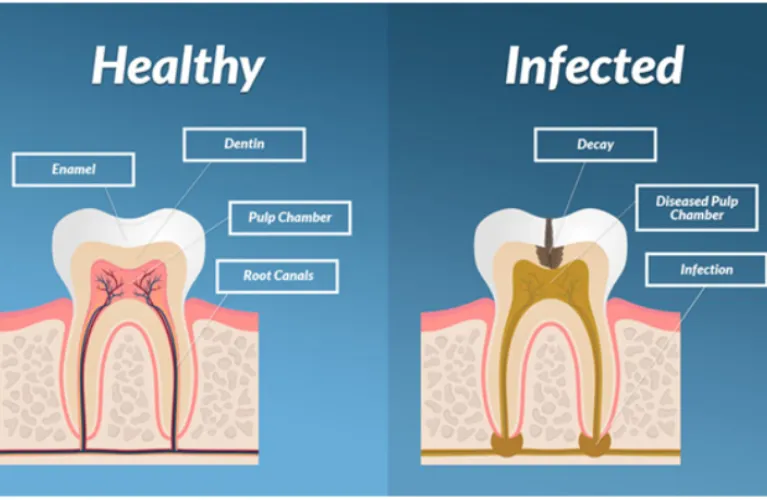
When is a root canal treatment needed | Root Canal Treatment In Vadodara
A root canal is needed when the pulp, which is the soft tissue inside the tooth, becomes inflamed or infected pulp, or inflamed.
This typically occurs due to
- deep decay,
- a cracked or fractured tooth,
- repeated dental procedures on the tooth, or trauma.
- A root canal treatment is performed to remove the infected pulp, clean the tooth’s interior, and seal it to prevent further infection.
What are some symptoms that show you may need root canal treatment? | Root Canal Treatment In Vadodara
Sometimes you may be unaware of your tooth infection. However, there are some signs treated tooth, that can be observed. Signs of bacterial infection present after undergoing invasive dental treatment include:
Tooth pain that doesn’t go away:
Many dental problems can cause tooth pain. If you have pain deep in your tooth, you may need root canal therapy. Discomfort may also radiate to your jaw, face, or other teeth.
Sensitivity to heat and cold:
If your tooth hurts when you drink hot coffee or eat ice cream, it could mean that you need root canal treatment. This is especially true if the pain lingers for more than a few seconds.
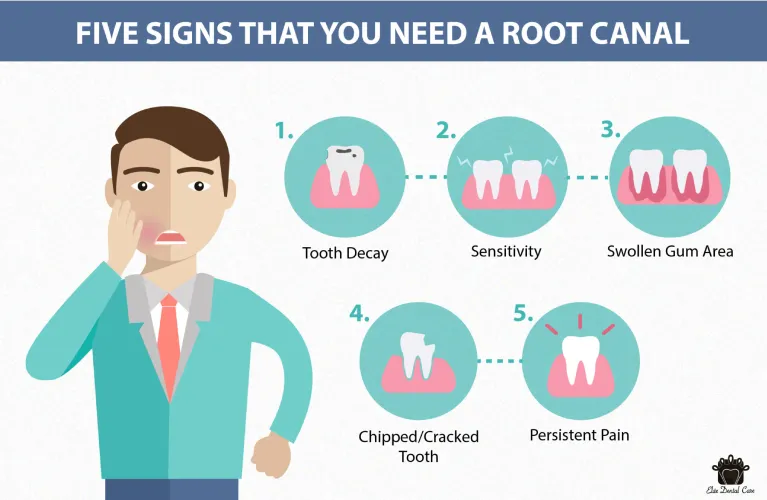
Swollen gums:
When a tooth is infected, pus can collect in the area. This can lead to puffy, swollen or tender gums.
Pimple on the gums:
You may develop a pimple or boil on the gums. Pus from the infected tooth may drain from the pimple, causing an unpleasant taste or smell.
Swollen jaw:
Sometimes pus doesn’t drain from the site. As a result, your jaw may become visibly swollen.
Tooth discoloration:
When the pulp of a tooth becomes infected, it can cause your tooth to look darker. This occurs because of poor blood supply to the tooth.
Pain when pressure is applied:
If you have pain when you eat or touch your tooth, it could mean the nerves around the pulp are damaged.
A chipped or cracked tooth:
If you’ve broken a tooth in an accident when playing sports or even by biting down on something hard, bacteria can reach all the way into the tooth pulp.
Loose tooth:
An infected tooth may feel looser. This is because the pus from the infected pulp can soften the bone that supports the tooth.
How common is root canal therapy?
Approximately 41,000 root canals in America are conducted daily. The average annual completion rate for root canals is 15 million.
How to prepare for a root canal treatment, follow these steps:
- Consultation: Schedule an appointment with an endodontist, a dentist who specializes in root canal treatments. Discuss your symptoms, concerns, and any questions you have.
- Medical history: Provide your complete medical history, including medications, allergies, and previous dental treatments. This information helps the dentist determine the best approach for your treatment.
- X-rays: X-rays or other imaging tests may be taken to assess the condition of the tooth and the surrounding structures. These images aid in the diagnosis and planning of the procedure.
- Antibiotics: If you have an active infection, your dentist may prescribe antibiotics to control the infection before the root canal treatment. Follow the prescribed dosage and complete the course.
- Pain management: Discuss pain management options with your dentist. They may recommend over-the-counter pain relievers or prescribe stronger medications if necessary.
- Eating and drinking: On the day of the procedure, avoid eating or drinking for a few hours prior to the appointment, especially if you will be receiving anesthesia.
- Comfortable clothing: Wear loose, comfortable clothing to your appointment to ensure you feel relaxed during the procedure.
- Anxiety management: If you experience dental anxiety, inform your dentist beforehand. They can suggest techniques such as deep breathing exercises, nitrous oxide (laughing gas), or other forms of sedation to help you relax during the treatment.
Remember, it’s essential to follow your general dentist’s specific instructions and communicate any concerns you may have to the general dentist before a dental procedure.
What happens during the root canal process? | Root Canal Treatment in Vadodara
Before beginning your root- canal treatment, your healthcare provider will take dental X-rays of the affected tooth. This helps determine the extent of damage and ensures that root canal therapy is the appropriate treatment option for significant pain. Here are the steps that will be completed during your root- canal treatment procedure:
Anesthesia.
First, local anesthesia is given to numb the infected tooth and the surrounding gums. There are also medications used in dentistry to help you relax, such as nitrous oxide, oral sedatives or intravenous (IV) sedation. Your healthcare provider may recommend sedation if you struggle with dental anxiety.
Dental dam placement.
Before beginning root canal treatment, a small rubber dam is placed over the area. This isolates the tooth and keeps it dry during the procedure.
Access hole.
Next, a small opening is made in the crown of the tooth to access the pulp.
Pulp removal.
Tiny dental instruments are used to remove the nerves, blood vessels, and tissues inside the tooth.
Shaping the canals.
Once the pulp is removed, the pulp chamber and root canals are cleaned, disinfected, and shaped.
Filling the canals.
The empty canals are then filled with a flexible, rubbery dental material called gutta-percha.
Sealing the tooth.
Next, a temporary dental filling is placed to seal the tooth and prevent bacteria from re-entering.
Placing the final restoration.
In most cases, you’ll need a dental crown to protect the treated tooth and restore your bite. Crowns are custom-made, and fabrication usually takes two to three weeks. When your crown is ready, the temporary filling is removed and the permanent crown is placed. In some instances, you may be able to receive a crown during the same appointment.
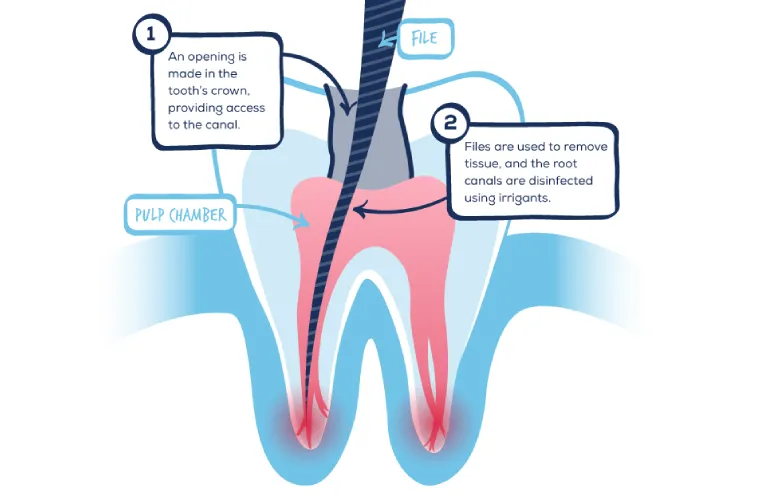
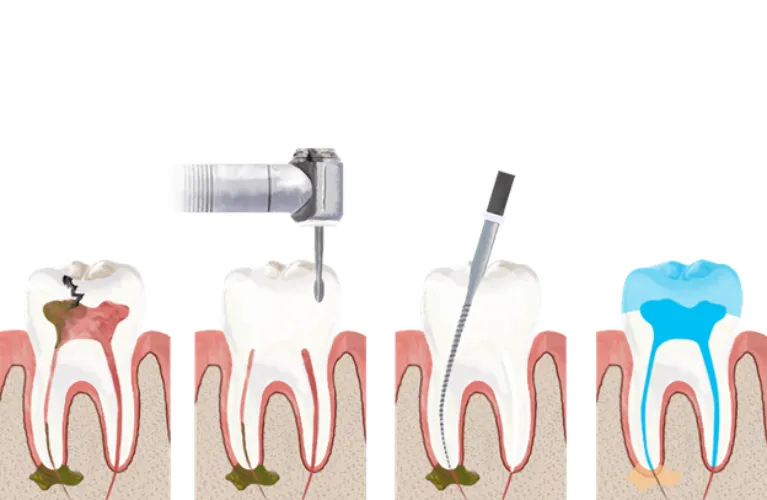
What are the alternatives to root canal treatment? | Root Canal Treatment IN Vadodara
In most countries, root canals can be avoided. Although natural teeth are best avoided wherever possible, extractions tooth extraction are possible in some cases to prevent infection and preserve good oral hygiene function.
Depending upon whether you have tooth decay or tooth rot you may need dental implants to repair them. If you’re interested in root canal surgery, please consult a health professional.
Who should perform my root canal procedure? | Root Canal Treatment In Vadodara
Root canal treatments can be performed by general dentists or by a general dentist or endodontist if endodontic treatment is desired.
Endodontic treatment with root canal, endodontic treatment, or general endodontic treatment with root canal specialist a general dentist may usually treat teeth near the teeth fronts, as they tend to lack underlying root systems and have fewer teeth.
If the damaged tooth in your case has more than one root or if tooth extraction is complicated, then the full endodontic treatment and canal treatment can be performed with the dental endodontist.
How long will it take to recover after a root canal procedure?
Recovery time for a root canal can take up to a week.
Do root canals hurt?
Some people fear tooth pain after root canal surgery. Because in most patients the contaminated tissue is eliminated in one canal during root canal safety surgery, many of these patients feel an immediate relief in restored tooth back.
Whenever a root canal reconstructive surgery is necessary you need to contact a doctor immediately to help with significant pain.
When is a root canal needed?
Surgically, root canal therapy can help remove oral germs and prevent infections, from a natural tooth below. Typically, infection is present because it occurs when the cavity in the natural tooth is left untreated long-term. This can happen as trauma damages or fractures other teeth below.
How long does root canal recovery take?
Root canal recovery usually lasts 3-5 hours. It might take one or two appointments and some days to feel some mild discomfort, aches and pain, but severe pain is usually managed by taking medicines. Do not hesitate to consult the medical provider.
What are common failed root canal symptoms?
Sometimes the dental surgeon who does dental work does permanent temporary filling in the root canal has problems. This especially applies if you have tooth damage that requires these root canal specialists for these kinds of procedures. Failed temporary filling of curved canals or permanent filling of root canals is the result of future infections.
FAQ
What are the 3 stages of root canal treatment?
This section describes what a root canal procedure is all about.
Root canal treatment stage1: Assessment and first cleaning.
Root canal treatment phase two: cleaning up and medications.
Treatment of root canal: Fill the root canal.
How long does a root canal last?
The average tooth should last 10 – 15 years if treated properly. Nevertheless, if you include crown dentistry in your treatment, it increases the lifespan considerably.
What are the risks of a root canal?
It is possible to have a bacterial infection that damages the surrounding tissues, like the skin. Depending upon the case, a patient might be experiencing teeth loss, which requires complicated and expensive restoration procedures. The toxic bacteria that surround root canal treatment teeth are similar to those found in gangrene.
What is the duration of RCT treatment?
Answers: Most root canals take 30-30 minutes. The most complicated case takes up to 90 minutes.
Is RCT good for teeth?
Root canal therapy is sometimes called endodontic therapy, and the procedure is performed if tooth decay reaches the pulp and causes inflammation. The pulp dies and tooth must be saved for extraction.
Is RCT better than extraction?
Root canal therapy is the most commonly used treatment for an infection of teeth. Nevertheless some circumstances exist, including traumatic teeth. Your dental specialist will examine your mouth to determine the appropriate treatment.
Is it painful to get a root canal?
The root canal procedure is not painful because the patient receives local anesthesia. Root canals are usually a little swollen feel sore & numb after procedures, but may also cause slight irritation.
How long does the root canal last?
The average lifespan of the teeth lasted 10-15 years after a root canal dental procedure done. A dentist can add a dental crown to their treatment to prolong its lifespan.
Does root canal need surgery?
A nonsurgical tooth removal may not save the tooth, so your endodontist may recommend surgery. Endodontic surgery may help locate a fractured bone or a hidden canal that were not previously identified by X-ray examinations.

